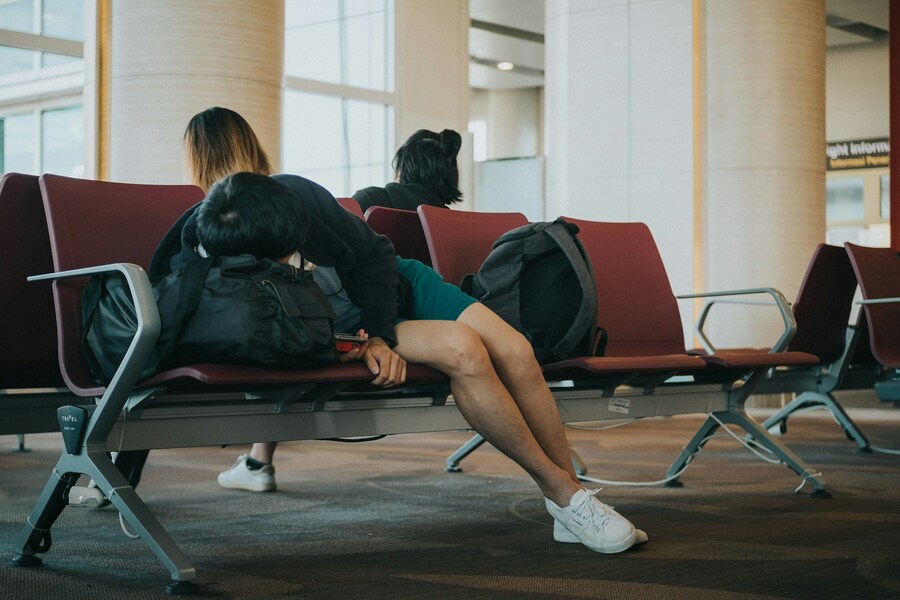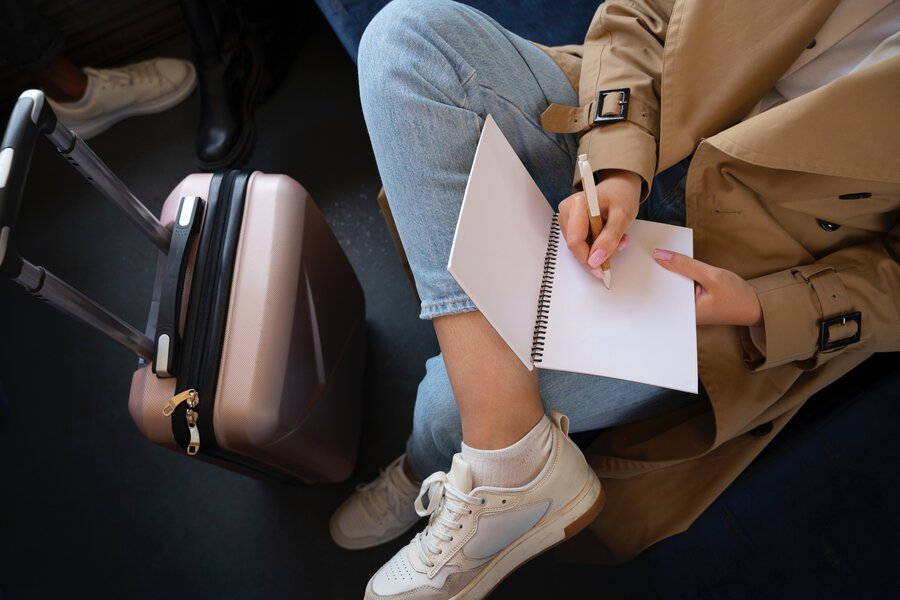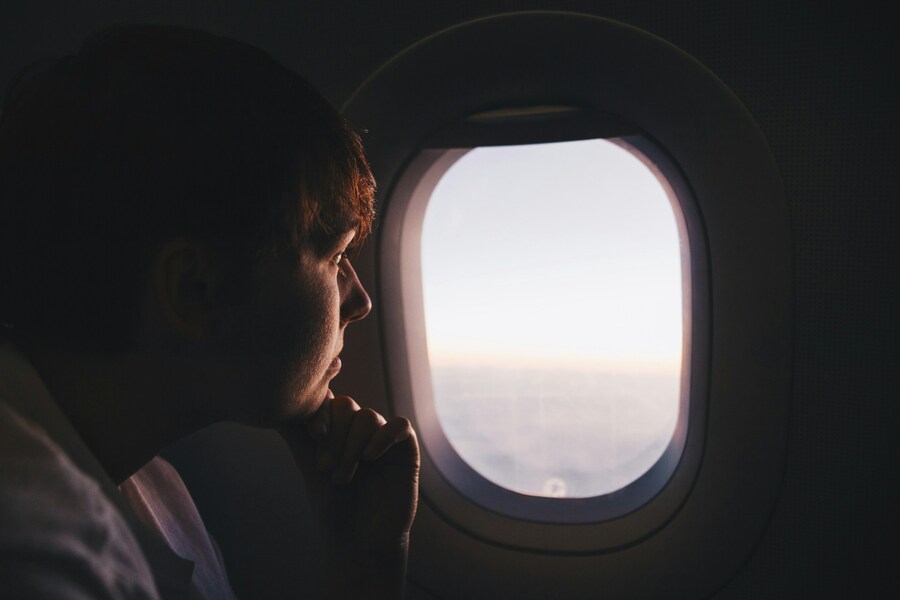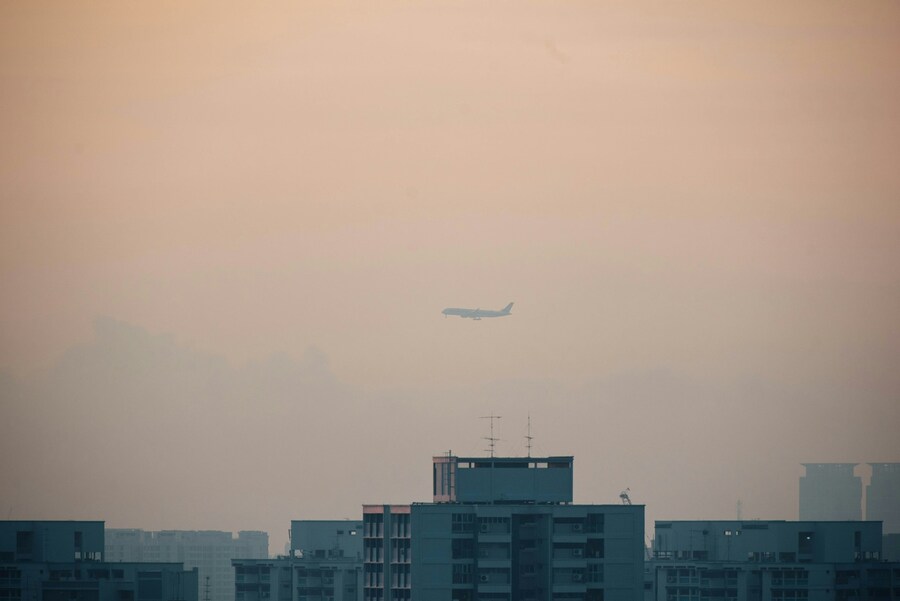Traveling can be physically challenging as it can have a negative impact on our body. Regardless of the mode of transportation we choose, whether it's a long-distance journey or not, it can leave us feeling exhausted, stressed, and sometimes even experiencing motion sickness. Although these effects are typically not significant enough for us to avoid traveling altogether, flying is no exception. When we fly at high altitudes for extended periods, there are potential side effects that can affect our bodies. Let's explore what happens to our bodies during air travel and how we can enhance our comfort levels!
So what actually happens to your body on an airplane?
Dehydration

Source: Alexander Grey/Unsplash
When flying in an airplane, the air humidity is lower compared to what we're used to on the ground. The levels of humidity differ depending on the number of people on board, with first class having as little as 5% humidity, while economy can have around 15 to 20%. A significant portion of the cabin air is brought in from the outside, which can have a humidity level as low as 1%. Even though this fresh air mixes with recirculated air, which has higher humidity, it still has a dehydrating effect on our bodies. As a result, you may experience dry nose, dry skin, or dry lips. In addition, low humidity levels can affect our sense of taste, making familiar drinks like Diet Coke taste different.
To combat the low humidity, there are a few things you can do. Firstly, if possible, choose an airplane equipped with better humidity features, such as the Boeing 787 or the Airbus A350. It's also important to drink plenty of water during the flight, as this will not only help with dehydration but also alleviate bloating. Consider using eye drops, nasal spray, and a good moisturizer to keep your eyes, nose, and skin hydrated. If you wear contact lenses, wearing glasses for the duration of the flight may be more comfortable.
Pressure imbalances

Source: Hayes Potter/Unsplash
When an airplane takes off or lands, you may experience discomfort in your ears. This is known as ear barotrauma and occurs when there is a difference in air pressure between your middle ear and the airplane. In addition to aiding in hearing, the middle ear contains the opening of the eustachian tube. Normally, this tube opens to equalize the pressure when the air pressure is greater than that of the middle ear. However, if you have a cold or blocked sinuses, this equalization may not occur, leading to pain during changes in pressure during takeoff and landing. Babies are especially susceptible to this as their eustachian tubes are not fully developed. In most cases, actions, such as sucking on a sweet, swallowing, or pinching your nose, can alleviate the problem. If the pain persists after you have left the airplane, it's advisable to consult a doctor.
Jet lag

Source: Joyce Romero/Unsplash
Jet lag occurs when our sleep patterns are disrupted due to traveling across multiple time zones. Our bodies naturally follow a daily rhythm, known as circadian rhythms, which help us sleep when it's dark and be awake during daylight. However, long-haul flights can disrupt this routine. For example, if you fly from New York City to London and arrive at Heathrow at 9 am, your body will still think it's 4 am and will crave sleep.
There are several strategies you can try to minimize the effects of jet lag. One approach is to adjust to the new time zone as quickly as possible. Set an alarm to wake up at the appropriate local time and eat meals accordingly. Staying hydrated by drinking water during the flight is beneficial, as substances like caffeine and alcohol can worsen jet lag. Some studies suggest that taking a melatonin supplement might help, but the results are inconclusive. If you're interested in exploring this option, consult with a healthcare professional. In addition, if you're planning a round-the-world trip, flying from east to west is generally easier for your body to adjust to since you gain time rather than lose it.
Deep vein thrombosis

Source: pikisuperstar/Freepik
A lot of travelers may experience swelling in their feet or ankles for a short period of time after a long flight. This is because staying still for a long time isn't good for the body. Whether you're on a plane, bus, or even at home, sitting for extended periods impacts certain bodily functions, including blood flow. When blood flow slows down, blood clots can form, leading to a rare but potentially life-threatening condition called deep vein thrombosis. To reduce this risk, it's important to move around the cabin and do exercises while seated, such as rotating your ankles or stretching your legs. In-flight magazines or entertainment systems often provide examples of exercises that can be done without leaving your seat. Those who are particularly susceptible to DVT can choose to wear compression socks, which can help reduce swelling.
Travel like a pro: smart parking starts with us – ParkingNearAirports.io!

Source: Luke Porter/Unsplash
In addition to our ultimate travel guide, we would also like to provide you with some more useful information on traveling, which will be handy for those who prefer doing this by air.
If you use your own car to reach the airport, you know it's critical to park it safely for the duration of your trip. Almost every airport has special on-site parking for this purpose. However, travelers aren't ready to spend a lot of money at the beginning of their trip, as this option is pretty costly. So what should we do then?
Our booking platform, ParkingNearAirports.io, offers travelers online reservations for parking just outside airports that are affordable and convenient. Our experienced team is dedicated to providing travelers parking options at over 100 airports in the US and Canada. The app allows customers to search and compare parking rates at up to 70 percent savings compared to the cost of on-site parking at all major airports.
What is actually off-site parking, and which advantages has this parking type, you may ask? So let's take a closer look at this question.
First of all, off-site parking is much cheaper. So you can save money and then spend the most considerable amount on the things you really want to try or see while traveling.
Secondly, off-site parking services are faster. It might seem that it's faster to park your car at the airport, but that's not always the case. Off-site parking offers you the following convenience: when you drive directly up to the entrance, a staff member pulls your luggage out of your vehicle and loads it into the shuttle. Then they park your car for you. After your baggage is loaded, you can take your seat in the shuttle, which will bring you and your bags to the airport. It's a hassle-free option that is usually faster.

Source: CHUTTERSNAP/Unsplash
Thirdly, it's much more convenient. People are always stressed before the trip, as there are many things you should keep in mind. Not to be late when taking off, fighting traffic, finding a parking place, wondering how long the shuttle service will take, and more can leave you annoyed before you step foot inside the airport. If you choose off-site parking, you are using the assistance of a private company that caters to travelers' needs. Such services can make your trip much more comfortable when you arrive at the airport and return home.
With ParkingNearAirports.io, it takes just a few clicks within the application to reserve a parking spot. Upon arrival at off-airport parking, customers receive a booking confirmation and a guaranteed parking spot. The app helps customers find the most convenient airport parking lots. If plans change, cancellations are hassle-free and refundable.
We also offer you services for top cruise ports in Florida, Louisiana, Maryland, New Jersey, and Texas.
Let's look at an example. Imagine that you live in Buffalo, New York, USA. If you're planning a trip to Europe, you can choose cheap parking near BUF Airport. If you're coming from Cleveland, Ohio, the situation is the same – you can use affordable Cleveland Airport valet parking. So it depends just on where you are flying from.
On our official website, you can find the best deals, airport parking rates, and other information connected with parking near US and Canadian airports.






